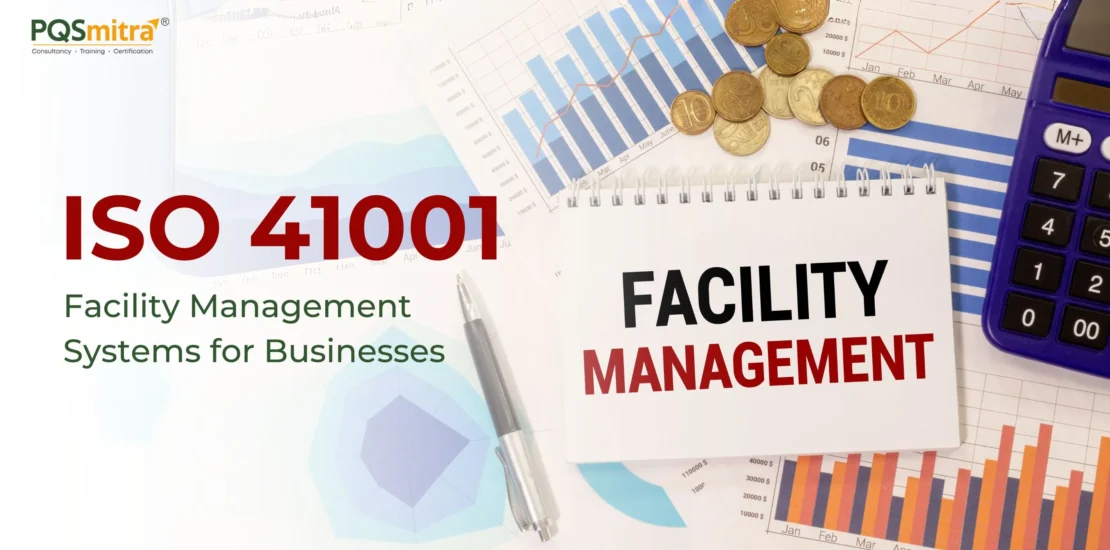- December 19, 2024
- Posted by: PQS_Mitra_Main_Access
- Category: ISO Certification

Introduction
From office buildings and manufacturing units to hospitals and malls, every physical space that a business operates in needs proper management. Cleanliness, energy use, safety, maintenance, and space optimization—these aren’t just operational tasks. They’re strategic functions that affect productivity, cost, and stakeholder satisfaction.
That’s where ISO 41001, the international standard for Facility Management Systems (FMS), comes in. It provides a structured approach to managing facilities efficiently, sustainably, and in alignment with the organization’s core objectives.
But simply implementing systems isn’t enough. Understanding them—across all levels of the organization—is what turns them into results.
Why Facility Management Deserves Strategic Attention
Facility management is often seen as a support function, but its impact runs deep. Think of a well-maintained workplace—it boosts employee morale, reduces downtime, saves energy, and improves customer experiences.
ISO 41001 recognizes this strategic value. It helps organizations:
- Align facility operations with business goals
- Optimize resource usage and reduce waste
- Maintain health, safety, and environmental standards
- Ensure compliance with regulations and service-level agreements
- Enable consistent service delivery through standardized processes
But to unlock these benefits, your team must go beyond following SOPs—they need to understand the “why” behind the processes.
When Organizations Start Noticing the Gaps
Many companies only realize the importance of awareness during audits or after inefficiencies surface. For example:
- Why are maintenance logs inconsistent?
- Who’s responsible for sustainability reporting?
- Are we optimizing space utilization across departments?
- Do contractors meet safety and service expectations?
These are not technical questions—they’re operational realities. Addressing them requires cross-functional awareness, not just isolated technical knowledge.
That’s why ISO 41001 is as much about communication and integration as it is about procedures and metrics.
Facility Management Is Everyone’s Job
Although facility management may be driven by a dedicated team, its success depends on collaboration with other functions—HR, IT, procurement, finance, and even end-users.
ISO 41001 introduces a lifecycle perspective—planning, implementation, monitoring, and continual improvement. It ensures that every stakeholder knows:
- What facility services are being delivered
- What performance is expected
- How feedback loops drive improvement
- How risks and opportunities are managed
When everyone’s on the same page, the organization benefits from smoother operations, reduced costs, and better decision-making.
Why Awareness Training Is a Smart First Step
Awareness is the starting point for every successful system. Before diving into process redesigns or audits, organizations need to ensure that their teams understand the basics of ISO 41001.
This becomes particularly important when:
- Implementing ISO 41001 for the first time
- Preparing for third-party certification
- Expanding facility operations across multiple locations
- Integrating facility management into business continuity planning
In such scenarios, awareness training helps unify understanding and expectations across departments, service providers, and leadership.
Training Helps Organizations Translate Standards Into Action
Facility management is a dynamic field—it involves people, spaces, technology, and services. ISO 41001 awareness training helps simplify this complexity and align efforts organization-wide.
Effective training focuses on:
- The purpose and scope of ISO 41001
- The structure and benefits of a facility management system
- Key roles and responsibilities within the FMS framework
- Common compliance and performance metrics
- How to integrate facility management with organizational strategy
Sessions can be delivered onsite or online, depending on the organization’s preference, and often include real-world case studies to highlight best practices and avoid common pitfalls.
Conclusion
Efficient facility management doesn’t happen by accident—it requires strategy, systems, and shared understanding. ISO 41001 offers a powerful framework to elevate facility management from a cost center to a value creator.
However, the true value of ISO 41001 lies in its practical implementation—and that starts with awareness. When employees and stakeholders understand the system, they don’t just follow processes—they contribute to improvement.
PQSmitra offers ISO 41001 awareness training to help organizations build robust, integrated facility management systems. Conducted online or onsite with certification, these sessions are designed to turn awareness into action—ensuring your facilities are always working in favor of your business goals.
Leave a Reply Cancel reply
Kindly submit a business inquiry online and we will get back to you!
OR
Call us on 022-2893 8687 | +91-9820204373
